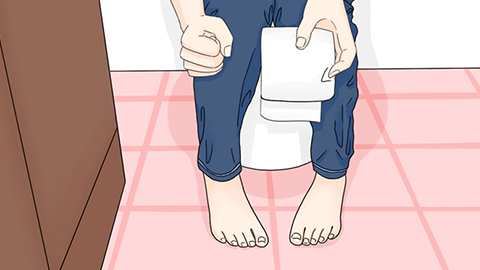What causes sticky stool and the feeling of incomplete bowel evacuation?
Under normal circumstances, sticky stool with a feeling of incomplete evacuation may be caused by excessive consumption of greasy food, lack of physical activity, intestinal dysfunction, chronic enteritis, or intestinal polyps. It is recommended to seek medical attention promptly, identify the underlying cause, and receive symptomatic treatment under a doctor's guidance. Specific analysis is as follows:

1. Excessive intake of greasy food: Long-term overconsumption of fried and high-fat foods can overwhelm the digestive system, leading to excess fat in the stool, making it sticky and difficult to fully pass. Adjust your diet by reducing high-fat and high-sugar foods, increasing fiber-rich foods such as vegetables and whole grains, and drinking 1500–2000 mL of water daily to promote intestinal motility.
2. Lack of physical activity: Prolonged sitting and inactivity slow down intestinal peristalsis, causing food residue to remain in the intestines for too long and excessive absorption of water, resulting in sticky stool and difficulty passing bowel movements. Engage in at least 30 minutes of moderate-intensity exercise daily—such as brisk walking, jogging, or yoga—to enhance intestinal motility and improve bowel movements.
3. Intestinal dysfunction: Stress, irregular sleep patterns, and other factors can disrupt the balance of gut microbiota and impair digestion, leading to sticky stools and a sensation of incomplete evacuation. Patients may take medications such as Bifidobacterium quadruple viable tablets, Bacillus subtilis bichloride viable granules, or Lactasin tablets as directed by a physician to regulate intestinal flora.
4. Chronic enteritis: Repeated irritation of the intestine by bacteria or viruses causes chronic inflammation, damages the intestinal mucosa, and weakens digestive and absorptive functions, resulting in abnormal, sticky stool with a feeling of incomplete evacuation, often accompanied by abdominal pain and bloating. Under medical supervision, medications such as sulfasalazine enteric-coated tablets, mesalazine enteric-coated tablets, or compound berberine tablets may be used to reduce intestinal inflammation and improve gut function.
5. Intestinal polyps: Abnormal growths (polyps) on the intestinal mucosa can obstruct the passage of intestinal contents, causing sticky stool and a persistent sensation of incomplete evacuation, potentially accompanied by rectal bleeding over time. Medication has limited effectiveness; polypectomy via colonoscopy is usually required to remove the polyps, restore normal intestinal passage, and prevent disease progression.
In daily life, maintain good dietary hygiene, avoid spoiled or contaminated food, establish a regular bowel movement routine, and avoid prolonged squatting during defecation to minimize intestinal irritation. By adjusting lifestyle habits and dietary patterns, you can help alleviate sticky stool and feelings of incomplete evacuation, thereby supporting overall intestinal health.




